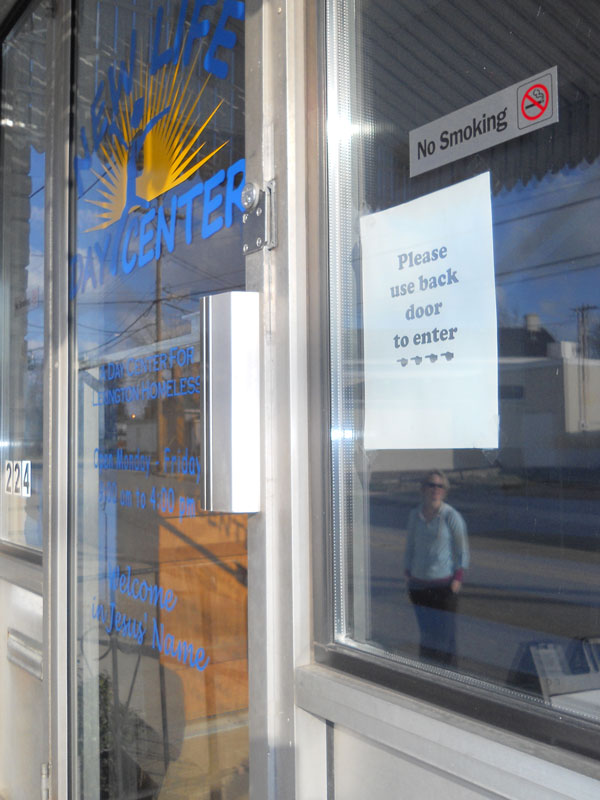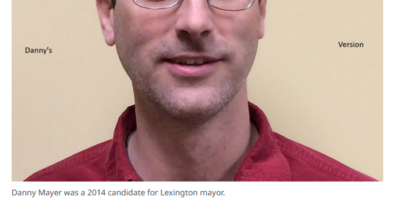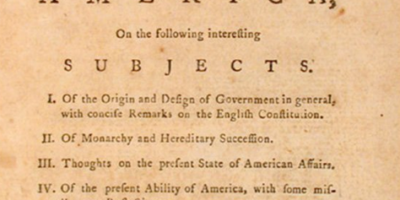By Danny Mayer
In early March, members of Lexington’s city council voted unanimously to pass a resolution in support of the restoration of voting rights to felons who had served their time in prison. The resolution was largely symbolic—the legal authority to re-enfranchise former felons lies in the hands of state lawmakers, not city council members. The resolution’s main purpose was to offer a demonstration of unified local political support for HB 70, a state bill sponsored by Fayette County congressman Jesse Crenshaw. His bill would allow Kentucky citizens to vote on a constitutional amendment that will automatically restore voting rights to most Kentucky felons who have completed the terms of their sentence (as happens in most other states).
In addition to the show of support, the council’s vote also sent another message to Frankfort politicians: let democracy happen. For the past seven years, the Kentucky House of Representatives has voted on and overwhelmingly passed HB 70, only to see it killed by Republicans Damon Thayer (Georgetown) and Joe Bowen (Owensboro) in the Senate’s Committee on State and Local Government. Consequently, despite the bill garnering increasingly bipartisan support among both state politicians and the general public, HB 70 has yet to leave its assigned Senate subcommittee.
An earlier non-vote
The clear, articulate and unanimous council support for both disenfranchised felons and the democratic process offers quite a contrast to the actions of at-large council member Steve Kay, who served as co-chair (and chief public representative) for the Mayor’s Commission on Homelessness.
The commission was formed in July to great fanfare and citizen engagement: over 110 people volunteered to serve on it (several NoC workers included); of that number, 33 were asked to serve. Over the course of six months, commission members held over thirty large and small meetings, and advertised two public gatherings. (Though all meetings were open to the public, the latter two were advertised and oriented as such.) In January, the commission issued a 63 page report that included 48 recommendations on homeless-related topics ranging from age demographic studies and day center counts to the city’s housing/wage gap and its system of data management.
Of the nearly fifty explicit calls to action, the number one recommendation given by the Mayor’s Commission in its report back to the Mayor—cited in the Executive Summary as a “comprehensive and foundational” need for addressing the other action items—was this:
“Increase from 5% to 6% the present fee assessed on insurance premiums, to create an Affordable Housing Trust Fund that will provide a consistent, reliable, dedicated funding stream to address the recommendations contained in this report.”
The report went on to contextualize the fee, noting that it represented “an increase of .5% above the recommendation of the Affordable Housing Task Force proposal presently being considered by Urban County Council and reflects the expanded scope of programs and services included in this report’s recommendations which would be funded in part by the fee increase.”
Sitting before the city’s Budget and Finance Committee on February 19, Kay delivered the Commission’s “foundational” proposal. I wasn’t at the meeting and can’t find the committee meeting notes online, but you can find the text of Kay’s address at his website. Delivered two weeks before he publicly joined fellow council members in symbolic support of HB 70 and the democratic process itself, Kay’s comments deserve scrutiny.
The address begins, “I would like to provide an update on where I think we stand regarding the specific proposal before the committee, which is an ordinance that would create an Affordable Housing Trust Fund and increase by 1% the fee presently imposed on a range of insurance premiums.”
Spoiler alert: things devolve from this brief moment of clarity, at least if you are a fan of the two principal actors undergirding calls to pass HB 70: disenfranchised human beings and the democratic ideal.
Ultimately, Kay declined to bring the proposal to a subcommittee vote, though if you read the report given to the committee, you may have a difficult time getting that message. Kay, who holds a UK PhD in meeting-facilitation-and-effective-corporate-communication, packaged his pass at democracy in textbook A+ conflict avoidance manner. Here’s the playbook.
First, open with three paragraphs that accentuate the positive: “I have discussed this issue with all council members and with the administration…. appreciation for the work of the commission and a clear recognition of the need that exists…. significant level of commitment to create the structures and find the resources.”
Next comes the soft hinge paragraph: “…not adequate support at this time for the specific path forward …Those with reservations would like to see… Some believe that…”
Follow with a responsibility dump-off to the next schlub: “In a moment I will ask Mayor Gray to provide information…”
Finally, in paragraph seven of Steve Kay’s nine-paragraph address to the LFUCG Budget and Finance Committee on behalf of the Mayor’s Homeless Commission, comes the content. You knew it was coming, didn’t you?
“I had intended to make a motion to move the proposed ordinance onto the council docket. I have become convinced that doing so without addressing the concerns that have been expressed, and without, as a consequence, adequate votes to win approval from council, would be counter-productive…I am asking that the proposed ordinance be kept in committee…until such time as it either makes sense to move the proposed ordinance forward to council in its present form, or until such time as there is an alternative proposal…”
In terms of leadership, think of it as the anti-Crenshaw, the act of giving up before even registering an at-bat (much less seven of them).
One, two, many disenfranchisements

Homeless clients must use back door to enter the New Life Day Center on Martin Luther King Boulevard. Photo by Danny Mayer.
For the many individuals and groups who have toiled over the past decade lobbying lawmakers and building support for HB 70, the refusal by two Republican politicians to stonewall a committee vote has been a particularly sore point. It is a telling and frustrating irony that in attempting to continue with the status quo of disenfranchised former felons, Thayer and Bowen have had to disenfranchise all sorts of voting citizens: members of church groups, KFTC members, prisoner families, Republicans, Democrats. The Lexington resolution both channeled and reflected those frustrations. It was a statement, albeit a symbolic one, that called upon the General Assembly to perform a basic function of elected office–to vote on issues that come before them.
But let’s be clear, felons are not the only people who have been restricted from full participation in our voting republic. And obtuse, flat-earth Republicans are not the only people limiting citizen attempts at participation in their government.
Writing in this month’s Rolling Stone, journalist Matt Taibbi detailed a group of Californian’s push to repeal the state’s Proposition 184, known more commonly as the Three-Strikes Law. Enacted as part of Republican “tough on crime” initiatives, Prop 184 mandated that citizens receive automatic lifetime sentences upon a third conviction. For many prisoners now serving life sentences in the prison system, the third strike came on fairly petty offenses: stolen pizzas, baby shoes, video tapes. Small amounts of drugs.
Interestingly, as a collection of Stanford law students, some of their professors and a variety of prison activists began to take up the cause of overturning Prop 184, they found that liberals, a body the group supposed would support the overturn of Three Strikes, never stood up. Instead, it was conservative Republicans, citing their values based in fairness, who offered support. Liberals, Taibbi records one activist telling him, “would say things like, ‘I hear you, but I really care about environmental causes, education for the poor.’ What it came down to, though, is that these people just don’t care about the poor people of color who are locked up, and would as soon see them not released.”
It’s hard not to think of Steve Kay when reading the above description. A long-time urban pioneer and creative consultant, Kay won an at-large seat during the city’s progressive power shift in 2010, which also saw happily gay urban art lover Jim Gray, a developer heading a multi-national company, elected to mayor.
Kay speaks the language of local progressives: an optimistic and urban-based belief in an inclusive multi-cultural future where education and local jobs and all the other good stuff will be at hand for all. It is a great vision and wonderful idea. But is it any different than that of California sunshine liberals–that is, is it anything more than a rhetoric hiding business as usual?
Three blocks down my street, Martin Luther King Boulevard, between Third and Second streets sits the New Life Day Center. New Life is one of the only homeless day centers to offer residents a locker to store their belongings; one of its stated objectives is to function as a connector facility for homeless residents to connect to the city’s public services programs and facilities (most of which as been relocated from downtown to the Loudon/Newtown corridor). New Life opened in the winter of 2011/2012 to some limited though vocal neighborhood resentment. Kay, who like me lives blocks from the center, moderated what were described as the concerns of “neighborhood” residents and the operators of New Life. Here’s the policies that were enacted:
(1) Homeless clientele must enter through the back door. (That’s right: some people on the boulevard named for civil rights activist Martin Luther King still do have to use the back door, and yes, those decisions are still largely brokered by upper crust white politicians caving to “sensible” policies.)
(2) One week of extra police surveillance of the site during its early weeks of operation. (Police noted no increase in crime, which has generally declined in the immediate area of gentrification where the center sits.)
(3) Institute a neighborhood watch whose sole goal is to monitor crime that occurs within a 2 block radius of the Center. (When I asked if he was monitoring bars, too, for lawbreaking, I received no answer. When I asked if we could monitor positive community occurrences in that 2 block radius, he said he’d get back to me…and never did.)
Kay’s argument for his actions usually depend on achieving some sort of balance. In this case, it was balancing the needs of area “neighbors” against those of the homeless. In the case of the Planning Division non-vote, it was the needs of the council members and mayor against those of the Commission on Homelessness. Both instances shed light on a local progressive reality as it moves from rhetoric to action: its the same old people and the same old needs that get spoken for.
Now what? Time to be a leader
Kay voted symbolically for felons to get a vote. He should reconsider his own anti-democratic actions as a local representative. Because it’s not just the homeless whom he is silencing. A collection of 33 community members who worked diligently to produce a detailed report are also being silenced, as are neighbors like me—people who prefer to act upon the principals claimed by progressive rhetoric. We are all of us getting disenfranchised, not represented.
Unlike his HB 70 vote, Kay can actually do something about this re-enfranchisement—if only he stands up and acts like a leader. In the words of homeless activist Jerry Moody: “Let them vote. Let us know where the votes are; let us know the concerns; let us do our job as citizens to persuade our representatives with good arguments, just as Crenshaw has done with HB 70.”
Article was edited April 15, 2013.




Charles Warren
Nonsense. This is more white, liberal effeminate nonsense coming from a woman who wants more government, more firefighters, more police to come rushing to her aid.
Aiiee! I’m dying over herel! Someone help me!!